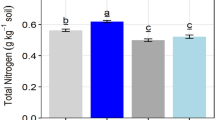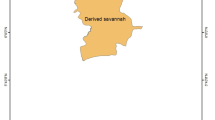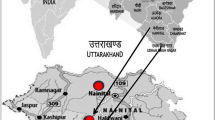Abstract
In central Côte d’Ivoire, the low level of savanna soil fertility has led farmers to prefer wooded areas, resulting in pressure risks to Lamto Scientific Reserve. To tackle this alarming situation, abandoned termite mounds can be used as a cultural amendment to restore soil fertility. Thus, the study investigated physicochemical properties of different termite mounds soils (Nitiditermes, fungus-growing species inhabiting mounds, Procubitermes, Trinervitermes, and Macrotermes) and their adjacent soils in order to show that they are more stable and fertile than soils. Soil samples were taken from abandoned mounds to analyse their physicochemical properties and trace elements. All soils are almost neutral (pH ≈ 7) and favourable for nutrient availability. Compared to adjacent soils, termite mounds have a higher cation-exchange capacity and are rich in fine elements (except Trinervitermes soils). Chemical elements (carbon, nitrogen, organic matter, phosphorus, cation exchange capacity, and potassium) are consistently abundant in Nitiditermes, Procubitermes, and Trinervitermes mound soils. High quantities of trace elements were found in soils without reaching toxicity levels. This study suggests that soils of Procubitermes, Trinervitermes, and Nitiditermes soils may be promoted as amendments of soils especially for vegetables that do not require large areas.


Similar content being viewed by others
Data Availability
Yes.
Code Availability
R version 3.6.3 software.
References
AFNOR (1996) Dosage du carbone organique et du carbone total après combustion sèche. NF ISO 10694. Association Française de Normalisation Paris, France (French)
Altieri MA, Nicholls CI, Montalba R (2017) Technological approaches to sustainable agriculture at a crossroads: an Agroecological perspective. Sustainability 9(3):349. https://doi.org/10.3390/su9030349
Anderson JM, Ingram JSI (1994) Tropical soil biology and fertility: a handbook of methods. Soil Sci 157:265. https://doi.org/10.2307/2261129
Apori SO, Flarian MM, Hanyabui E, Muli GK, Wamuyu B (2020a) Role of military termites (Pseudocanthotermes militaris) in improving soil productivity in tropical agroecosystems. Annu Res Rev Biol 35(5):14–19
Apori SO, Murongo M, Hanyabui E, Atiah K, Byalebeka J (2020b) Potential of termite mounds and its surrounding soils as soil amendments in smallholder farms in central Uganda. BMC Res Notes 13:397. https://doi.org/10.1186/s13104-020-05236-6
Assémien FL, Pommier T, Gonnety JT, Gervaix J, Le Roux X (2017) Adaptation of soil nitrifiers to very low nitrogen level jeopardizes the efficiency of chemical fertilization in West African moist savannas. Sci Rep 7:10275. https://doi.org/10.1038/s41598-017-10185-5
Baize D (2000) Guide des analyses en pédologie: 2e édition, revue et augmentée. Editions Quae
Bera D, Bera S, Chatterjee ND (2020) Termite mound soil properties in West Bengal. India Geoderma Regional 22:e00293
Bignell D (2019) Termite ecology in the first two decades of the 21st century: a review of reviews. Insects 10:60. https://doi.org/10.3390/insects10030060
Bottinelli N, Jouquet P, Capowiez Y, Podwojewski P, Grimaldi M, Peng X (2015) Why is the influence of soil macrofauna on soil structure only considered by soil ecologists? Soil and Tillage Research 146:118–124. https://doi.org/10.1016/j.still.2014.01.007
Cheik S, Bottinelli N, Soudan B, Harit A, Chaudhary E, Sukumar R, Jouquet P (2019) Effects of termite foraging activity on topsoil physical properties and water infiltration in Vertisol. Appl Soil Ecol 133:132–137. https://doi.org/10.1016/j.apsoil.2018.10.001
Chisanga K, Mbega E, Ndakidemi P (2020) Prospects of using termite mound soil organic amendment for enhancing soil nutrition in Southern Africa. Plants 9:649. https://doi.org/10.3390/plants9050649
Coulibaly T, Akpesse AAM, Boga J-P, Yapi A, Kouassi KP, Roisin Y (2016) Change in termite communities along a chronosequence of mango tree orchards in the north of Côte d’Ivoire. J Insect Conserv 20:1011–1019. https://doi.org/10.1007/s10841-016-9935-1
Davies AB, Baldeck CA, Asner GP (2016) Termite mounds alter the spatial distribution of African savanna tree species. J Biogeogr 43:301–313. https://doi.org/10.1111/jbi.12633
Deke AL, Adugna WT, Fite AT (2016) Soil physic-chemical properties in termite mounds and adjacent control soil in Miyo and Yabello Districts of Borana Zone, Southern Ethiopia. American Journal of Agriculture and Forestry 4:69–74. https://doi.org/10.11648/j.ajaf.20160404.11
Dosso K, Kone F (2016) Influence de l’activité des termites sur les propriétés du sol dans la région de Lamto (Côte d’Ivoire): mesure de la vitesse d’infiltration de l’eau et de la quantité de matière organique en conditions expérimentales. J App Biosci 105:10203. https://doi.org/10.4314/jab.v105i1.16(French)
Dosso K, Koné F, Kouadio D, Konate S (2017a) Décomposition des résidus végétaux par les termites et apport de matière organique au sol dans la région de Lamto (Côte d’Ivoire). J Anim Plant Sci 33:5320–5331 (French)
Dosso K, Roisin Y, Tiho S, Konaté S, Yéo K (2017b) Short-term changes in the structure of termite assemblages associated with slash-and-burn agriculture in Côte d’Ivoire. Biotropica 49:856–861. https://doi.org/10.1111/btp.12471
Enagbonma BJ, Babalola OO (2019) Potentials of termite mound soil bacteria in ecosystem engineering for sustainable agriculture. Ann Microbiol 69:211–219
Erens H, Mujinya BB, Mees F, Baert G, Boeckx P, Malaisse F, Van Ranst E (2015) The origin and implications of variations in soil-related properties within Macrotermes falciger mounds. Geoderma 249(250):40–50. https://doi.org/10.1016/j.geoderma.2015.03.003
Govorushko S (2018) Economic and ecological importance of termites: a global review. Entomol Sci 22:21–35. https://doi.org/10.1111/ens.12328
Harit A, Moger H, Duprey J-L, Gajalakshmi S, Abbasi SA, Subramanian S, Jouquet P (2017) Termites can have greater influence on soil properties through the construction of soil sheetings than the production of above-ground mounds. Insect Soc 64:247–253. https://doi.org/10.1007/s00040-017-0541-3
Jouquet P, Bottinelli N, Shanbhag RR, Bourguignon T, Traoré S, Abbasi SA (2016a) Termites: the neglected soil engineers of tropical soils. Soil Sci 181:157–165. https://doi.org/10.1097/SS.0000000000000119
Jouquet P, Chaudhary E, Kumar ARV (2018) Sustainable use of termite activity in agro-ecosystems with reference to earthworms. A Review Agron Sustain Dev 38:3. https://doi.org/10.1007/s13593-017-0483-1
Jouquet P, Guilleux N, Caner L, Chintakunta S, Ameline M, Shanbhag RR (2016b) Influence of soil pedological properties on termite mound stability. Geoderma 262:45–51
Jouquet P, Guilleux N, Shanbhag RR, Subramanian S (2015) Influence of soil type on the properties of termite mound nests in Southern India. Appl Soil Ecol 96:282–287
Jouquet P, Traoré S, Harit A, Choosai C, Cheik S, Bottinelli N (2020) Moving beyond the distinction between the bright and dark sides of termites to achieve sustainable development goals. Curr Opin Insect Sci 40:71–76. https://doi.org/10.1016/j.cois.2020.05.010
Kamaraj S, Pandiaraj T, Malliga C, Srivastava PP, Madhusudhan KN, Zuinama L, Sinha AK (2018) Physico-chemical properties of termite mound soils and their foliar spray on Terminalia arjuna plant. Chem Sci Rev Lett 7:594–598
Konaté S (1998) Structure, dynamique et rôle des buttes termitiques dans le fonctionnement d’une savane préforestiere (lamto, côte d’ivoire): le termite champignonniste Odontotermes comme ingénieur de l’écosystème. Thèse de doctorat de l’Université Paris 6 (French)
Koné AW, Kassin EK, Ettien J-BD, Konaté Z, Gnahoua GM (2020) Le carbone des sols des zones de forêts et de savanes en Côte d’Ivoire. In: Chevallier T, Razafimbelo TM, Chapuis-Lardy L, Brossard M (eds) Carbone des sols en Afrique. IRD Éditions, pp 193–210 (French)
Koné NA, Soro B, Vanié-Léabo LPL, Konaté S, Bakayoko A, Koné D (2018) Diversity, phenology and distribution of Termitomyces species in Côte d’Ivoire. Mycology 9(4):307–315. https://doi.org/10.1080/21501203.2018.1500498
Kpangba TPMK, Mpika J, Makoundou A, Bita MA, Attibayéba A (2020) Effet de la terre des termitières sur la croissance de trois cultivars de la morelle noire (Solanum nigrum L. : Solanaceae) cultivée à Brazzaville (Congo). Int J Bio Chem Sci 14:192–203. https://doi.org/10.4314/ijbcs.v14i1.16(French)
Krishna K, Grimaldi DA, Krishna V, Engel MS (2013) Treatise on the Isoptera of the world: Termitidae (part one). Bull Am Mus Nat Hist 377:973–1495. https://doi.org/10.1206/377.4
Lagendijk DDG, Davies AB, Eggleton P, Slotow R (2016) No evidence for an elephant-termite feedback loop in Sand Forest, South Africa. Biol Conserv 203:125–133. https://doi.org/10.1016/j.biocon.2016.08.028
Lehmann E, Oltramare C, Nfon Dibié J-J, Konaté Y, de Alencastro LF (2018) Assessment of human exposure to pesticides by hair analysis: the case of vegetable-producing areas in Burkina Faso. Environ Int 111:317–331. https://doi.org/10.1016/j.envint.2017.10.025
Li Y, Dong ZY, Pan DZ, Pan CH, Chen LH (2017) Effects of termites on soil pH and its application for termite control in Zhejiang Province, China. Sociobiology 64:317–326. https://doi.org/10.13102/sociobiology.v64i3.1674
Lima SS de, Pereira MG, Pereira RN, Pontes RM de, Rossi CQ (2018) Termite mounds effects on soil properties in the Atlantic Forest biome. Rev Bras Ciênc Solo 42. https://doi.org/10.1590/18069657rbcs20160564
Mugerwa S (2015) Infestation of African savanna ecosystems by subterranean termites. Ecol Complex 21:70–77. https://doi.org/10.1016/j.ecocom.2014.11.009
Musundire R, Chidewe C, Samende BK, Chemura A, Bangira C, Andika OA, Chiwona-Karltun L (2021) Soil characteristics and nutritional traits of Macrotermes natalensis (Isoptera: Macrotermitinae) as indicators of nutritional quality in Zimbabwe. Int J Trop Insect Sci 41:2113–2124. https://doi.org/10.1007/s42690-020-00394-3
Muvengwi J, Mbiba M, Ndagurwa HGT, Nyamadzawo G, Nhokovedzo P (2017a) Termite diversity along a land use intensification gradient in a semi-arid savanna. J Insect Conserv 21:801–812. https://doi.org/10.1007/s10841-017-0019-7
Muvengwi J, Ndagurwa HGT, Nyenda T, Mbiba M (2016) Nutrient dynamics and plant assemblages of Macrotermes falciger mounds in a savanna ecosystem. Acta Oecologica 76:13–21. https://doi.org/10.1016/j.actao.2016.08.004
Muvengwi J, Witkowski ET, Davies AB, Parrini F (2017b) Termite mounds vary in their importance as sources of vegetation heterogeneity across savanna landscapes. J Veg Sci 28:1008–1017
Nampa G, Ndlovu M (2019) Association benefits between harvester termites (Trinervitermes trinervoides) and num-num plants (Carissa bispinosa) in a semi-arid savanna setting. J Arid Environ 171:104005. https://doi.org/10.1016/j.jaridenv.2019.104005
N’Dri AB, Kone AW, Loukou SKK, Barot S, Gignoux J (2019) Carbon and nutrient losses through biomass burning, and links with soil fertility and yam (Dioscorea alata) production. Ex Agric 55(5):738–751. https://doi.org/10.1017/S0014479718000327
Olsen SR, Sommers LE (1982) Phosphorus. In: Methods of soil analysis, American Society of Agronomy. Madison, pp 403–431
Ouedraogo J, Nacro H, Ouédraogo E, Youl S, Sedogo M (2015) Amélioration de la disponibilité du phosphore par la gestion de la macrofaune du sol : cas d’un lixisol en zone semi-aride du Burkina Faso. Int J Biol Chem Sci 8:1838. https://doi.org/10.4314/ijbcs.v8i4.41(French)
Pellegrini AFA (2016) Nutrient limitation in tropical savannas across multiple scales and mechanisms. Ecology 97:313–324. https://doi.org/10.1890/15-0869.1
Penn C, Camberato J (2019) A critical review on soil chemical processes that control how soil pH affects phosphorus availability to plants. Agriculture 9:120. https://doi.org/10.3390/agriculture9060120
Sane C (2016) Relations entre le fonctionnement des agrosystèmes à base de manguiers et les dégâts des termites (Termitidae: Isoptera) dans les régions de Thiès et de Dakar, au Sénégal. Université Cheikh Anta Diop De Dakar (French)
Schyra J, Korb J (2019) Termite communities along a disturbance gradient in a West African Savanna. Insects 10:17. https://doi.org/10.3390/insects10010017
Silué KS, Konaté S, Linsenmair KE (2018) Determinants of termite assemblages’ characteristics within natural habitats of a Sudano-Guinean Savanna (Comoe National Park, Côte d’Ivoire). Insects 9:189
Sonko AM, Sall D, Ndiaye AB (2019) Les termites (Termitoidae Latreille 1802) ravageurs du manioc (Manihot esculenta Crantz 1766) dans la zone de Tivaouane (Sénégal). Int J Biol Chem Sci 13(4):2005–2020. https://doi.org/10.4314/ijbcs.v13i4.8(French)
Soro D, Yeo L, Konate Z, Guei MA, Zro-Bi GF (2021) When termites’ waste products highlight a fundamental law of fertilization under rainfed rice cultivation in West Cote d’Ivoire. European J Agric Food Sci 3:53–60. https://doi.org/10.24018/ejfood.2021.3.1.218
Tarnagda B, Tankoano A, Tapsoba F, Sourabié Pane B, Abdoullahi Hissein O, Djbrine AO, Drabo KM, Traoré Y, Savadogo A (2017) Évaluation des pratiques agricoles des légumes feuilles : le cas des utilisations des pesticides et des intrants chimiques sur les sites maraîchers de Ouagadougou. Burkina Faso J App Bioscience 117:11658. https://doi.org/10.4314/jab.v117i1.3(French)
Verspoor RL, Soglo M, Adeoti R, Djouaka R, Edwards S, Fristedt R, Langton M, Moriana R, Osborne M, Parr CL, Powell K, Hurst GDD, Landberg R (2020) Mineral analysis reveals extreme manganese concentrations in wild harvested and commercially available edible termites. Sci Rep 10:6146. https://doi.org/10.1038/s41598-020-63157-7
Acknowledgements
We would like to thank KOUASSI Kouassi, N'GORAN Bernard and KOUASSI Brou Sylvain for their precious help during data collection in the field. We would also like to thank Prof. YÉO Kolo, Director of Lamto Ecology Station for the facilities provided during our work. This study was supported by a research grant offered by the International Foundation for Science (IFS) (ref: C/6356-1).
Funding
The International Foundation for Science (IFS) supported this study by the research grant. International Foundation for Science,C/6356–1,Foundiéré KONÉ
Author information
Authors and Affiliations
Contributions
All authors have contributed equally to this work.
Corresponding author
Ethics declarations
Ethics Approval
Not applicable.
Consent to Participate
Not applicable.
Consent for Publication
Not applicable.
Competing Interests
Not applicable.
Additional information
Publisher's Note
Springer Nature remains neutral with regard to jurisdictional claims in published maps and institutional affiliations.
Rights and permissions
About this article
Cite this article
Koné, F., Dosso, K. & Konaté, S. Agronomical potentiality of termite mound soils in a transitional zone in central Côte d’Ivoire. J Soil Sci Plant Nutr 22, 1394–1402 (2022). https://doi.org/10.1007/s42729-021-00740-5
Received:
Accepted:
Published:
Issue Date:
DOI: https://doi.org/10.1007/s42729-021-00740-5




